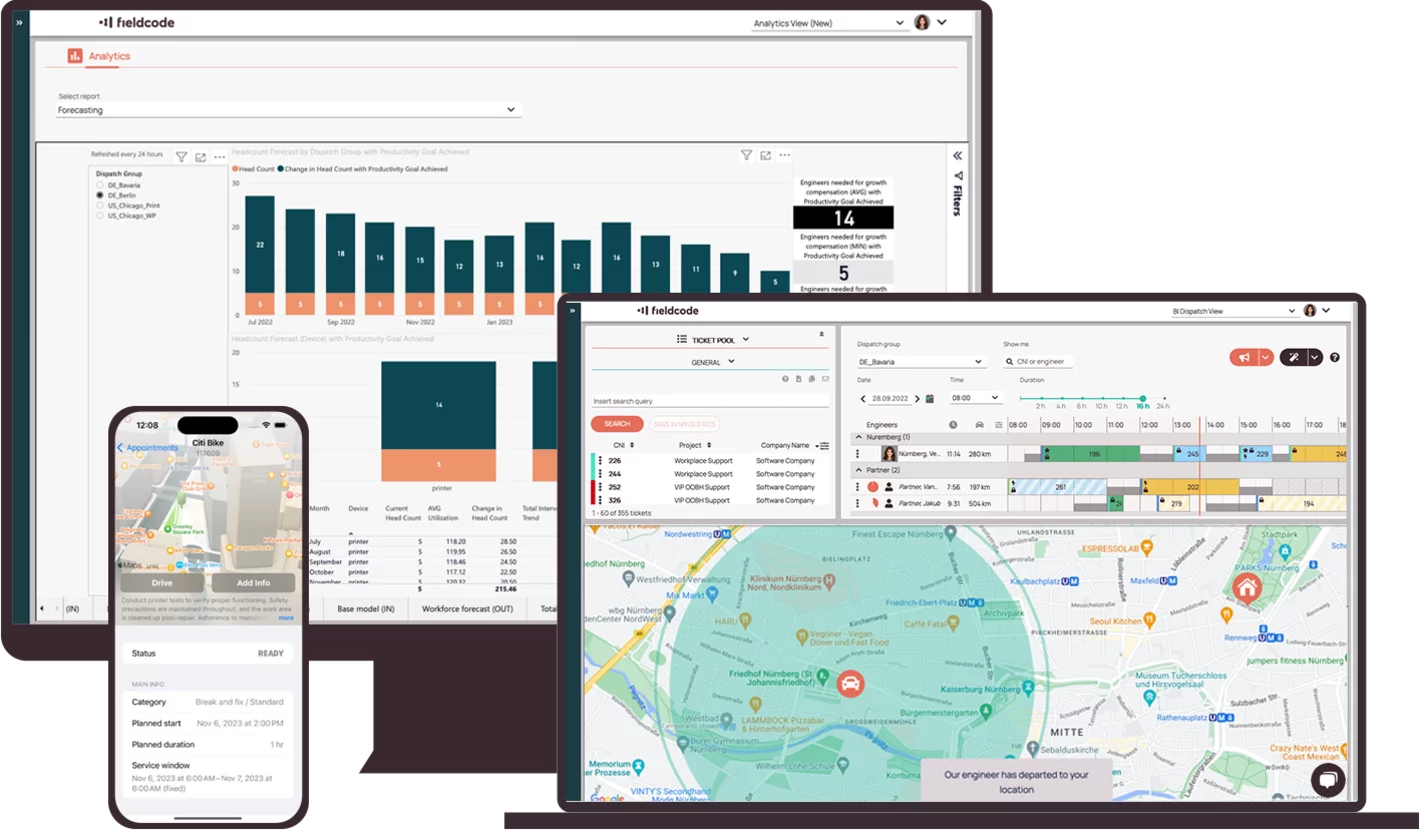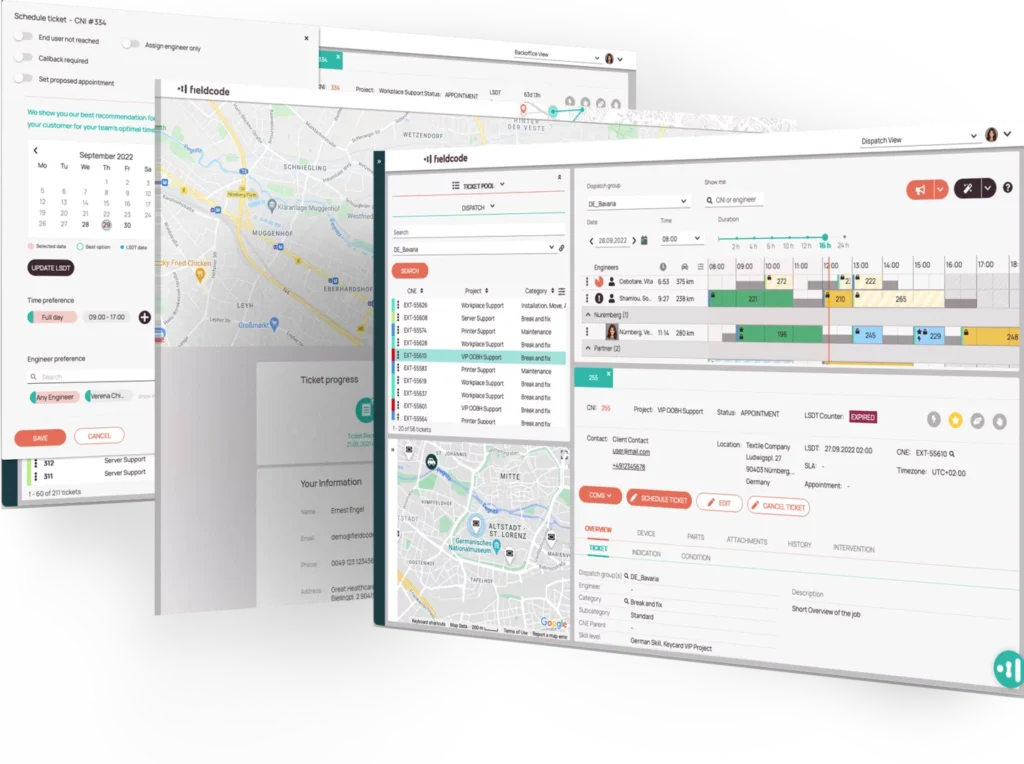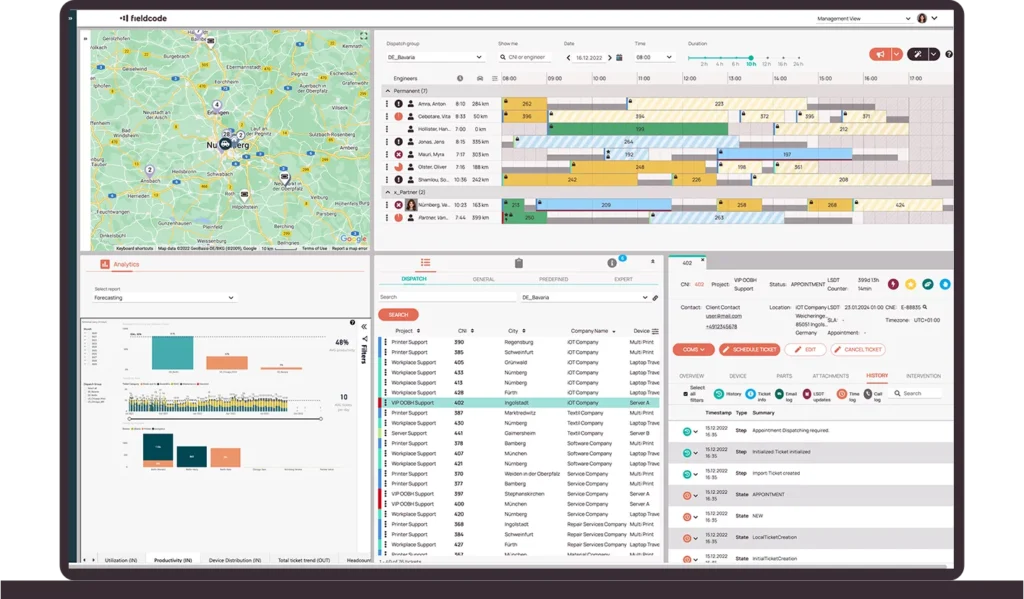Frequently Asked Questions about Field Service Management (FSM)
Welcome to our comprehensive guide to Field Service Management (FSM). Below, we’ll explore the ins and outs of FSM, why it’s important, its key components, current trends, effective management strategies, the benefits of using FSM software, common challenges, and how to choose the right FSM solution for your business.

What is Field Service Management (FSM)?
Field Service Management (FSM) is the coordination and management of a company’s field operations, which typically involve deploying workers or contractors to locations outside the company’s premises to install, maintain, or repair equipment and systems. The definition of FSM includes a wide range of activities including scheduling, dispatching, tracking, and optimizing field service workers’ performance.
A comprehensive FSM system integrates various tools and processes to ensure that field service operations run smoothly and efficiently. This can include:
- Scheduling and dispatching: Automating the assignment of tasks to the right technician based on their skills, location, and availability.
- Work order management: Managing and tracking the status of service requests, from initiation to completion.
- Inventory management: Keeping track of parts and supplies needed for fieldwork.
- Customer management: Ensuring customer information and history are easily accessible to service technicians.
- Mobile access: Providing technicians with mobile tools to access job details, update status, and communicate with the office in real-time.
Using an FSM system can lead to increased productivity, improved customer satisfaction, and reduced operational costs.
Why is Field Service Management important?
Field Service Management is important for businesses that rely on field operations. Understanding the importance of field service management is crucial as it ensures that tasks such as installations, maintenance, and repairs are carried out efficiently and to a high standard, leading to several FSM benefits:
- Improved efficiency: FSM systems automate and streamline processes like scheduling, dispatching, and work order management, reducing the time and effort required to manage field operations.
- Enhanced customer satisfaction: By ensuring timely and accurate service delivery, FSM systems help in meeting customer expectations, leading to higher satisfaction and loyalty.
- Cost savings: Efficient resource allocation and inventory management reduce unnecessary expenses, optimizing the overall operational costs.
- Real-time information: FSM provides real-time data and communication between field workers and office staff, improving decision-making and responsiveness.
- Increased productivity: Automating routine tasks and providing mobile access to field workers allows them to focus more on their core tasks, thus enhancing productivity.
The value of FSM lies in its ability to integrate and streamline various aspects of field service operations, leading to better performance and outcomes. This is why FSM is important for any business looking to maintain a competitive edge through superior field service management.
What are the key components of Field Service Management?
Understanding the key components of field service management is essential for any business looking to optimize its field operations. The FSM components encompass a range of tools and processes designed to ensure efficiency and effectiveness. Here are the key elements of FSM:
- Scheduling and dispatching: Automating the assignment of tasks to the appropriate technician based on their skills, location, and availability, ensuring timely and efficient service delivery.
- Work order management: Managing and tracking the status of service requests from initiation to completion, providing a clear overview of ongoing and completed tasks.
- Inventory management: Keeping track of parts and supplies needed for fieldwork, ensuring that technicians have the necessary materials to complete their tasks without delays.
- Customer management: Ensuring that customer information and service history are easily accessible to technicians, allowing for personalized and informed service interactions.
- Mobile app: Providing technicians with mobile tools to access job details, update status, and communicate with the office in real-time, enhancing responsiveness and productivity.
- Reporting and analytics: Offering detailed insights into field operations, helping businesses make informed decisions and continuously improve their service delivery.
These field service management features are the FSM essentials that help businesses streamline their operations, improve customer satisfaction, and reduce costs.
What are the current trends in Field Service Management?
Keeping up with the latest trends in field service management is essential for businesses aiming to stay competitive and efficient. Here are some of the current FSM trends in Field Service Management:
- Artificial Intelligence (AI) and Machine Learning: AI and machine learning are being increasingly integrated into FSM systems to optimize scheduling, predict maintenance needs, and provide intelligent insights for better decision-making.
- Internet of Things (IoT): IoT devices are transforming field service by enabling real-time monitoring of equipment and assets, allowing for proactive maintenance and reducing downtime.
- Mobile solutions: Enhanced mobile applications are empowering field technicians with real-time access to job details, customer information, and inventory, improving efficiency and customer service.
- Cloud-based FSM solutions: The shift towards cloud-based FSM solutions offers greater scalability, flexibility, and accessibility, enabling businesses to manage field operations from anywhere.
- Customer-centric services: There is a growing focus on improving customer experiences through personalized service, real-time updates, and feedback mechanisms integrated into FSM systems.
- Data analytics and reporting: Advanced analytics tools are providing deeper insights into field operations, helping businesses to identify trends, measure performance, and make data-driven decisions.
- Augmented reality (AR): AR is being used to provide remote assistance to field technicians, allowing them to visualize complex tasks and receive guidance in real-time, enhancing their capabilities.
- Generative AI: Generative AI is being leveraged to create dynamic training materials, automate documentation, and simulate various field scenarios, enhancing training and operational efficiency.
These field service management trends are driving the future of FSM, enabling businesses to operate more efficiently, provide better service, and stay ahead of the competition.
How do you manage Field Service engineers or technicians effectively?
Effective managing field service engineers or technicians is critical to ensuring that field operations run smoothly and efficiently. Here are the key strategies to manage field service engineers effectively:
- Comprehensive training: Provide ongoing training and development opportunities to ensure your engineers have the latest skills and knowledge to perform their tasks efficiently.
- Clear communication: Maintain clear and consistent communication channels between field service engineers and the office to ensure everyone is on the same page and any issues can be addressed promptly.
- Efficient scheduling and dispatching: Utilize FSM software to automate and optimize scheduling and dispatching, ensuring the right engineer is assigned to the right job based on their skills, location, and availability.
- Performance monitoring: Use real-time tracking and performance monitoring tools to keep an eye on your engineers’ productivity and address any issues as they arise.
- Mobile access: Equip your engineers with mobile tools that provide access to job details, customer information, and inventory, enabling them to perform their tasks more efficiently and effectively.
- Feedback mechanisms: Implement feedback systems where engineers can report back on job status, challenges faced, and customer feedback, allowing for continuous improvement.
- Resource management: Ensure that engineers have access to the necessary tools, parts, and support to complete their jobs without delays.
- Incentives and recognition: Recognize and reward high-performing engineers to boost morale and motivate your team to maintain high standards of work.
By employing these FSM engineer management practices, you can ensure your field service operations are efficient, your engineers are motivated, and your customers are satisfied.
What are the benefits of using Field Service Management software?
There are numerous FSM software benefits that can greatly enhance the efficiency and effectiveness of your field service operations. Here are some key advantages of Field Service Management (FSM) software:
- Improved scheduling and dispatching: FSM software automates and optimizes the scheduling and dispatching process, ensuring that the right technician is assigned to the right job based on their skills, location, and availability.
- Enhanced communication: Real-time communication tools within FSM software facilitate seamless interaction between field technicians and office staff, ensuring quick resolution of issues and better coordination.
- Increased productivity: By automating routine tasks and providing mobile access to job details, inventory, and customer information, FSM software enables technicians to focus more on their core responsibilities, leading to increased productivity.
- Better resource management: FSM software helps in managing and tracking inventory, tools, and other resources, ensuring that technicians have what they need to complete their jobs without delays.
- Customer satisfaction: Timely and efficient service delivery, coupled with accurate and updated information provided by FSM software, leads to improved customer satisfaction and loyalty.
- Data-driven insights: Advanced analytics and reporting features in FSM software provide valuable insights into field operations, helping businesses make informed decisions and identify areas for improvement.
- Cost savings: Optimized resource allocation, reduced downtime, and improved operational efficiency lead to significant cost savings over time.
What are common challenges in Field Service Management?
There are several FSM challenges that businesses often face. Understanding these field service management issues is crucial for improving operations. Here are some common FSM problems:
- Scheduling conflicts: Coordinating multiple service requests and ensuring the right technician is available at the right time can be complex.
- Communication gaps: Inefficient communication between field technicians and the office can lead to misunderstandings and delays.
- Resource management: Keeping track of inventory, tools, and equipment to ensure technicians have what they need can be difficult.
- Customer expectations: Meeting high customer expectations for timely and effective service is a constant challenge.
- Data management: Collecting, analyzing, and utilizing data effectively to improve decision-making can be overwhelming.
- Technician training: Ensuring that all technicians are adequately trained and up-to-date with the latest technologies and practices.
Addressing these FSM difficulties requires a robust FSM system that can streamline processes and enhance efficiency.
How do you choose a Field Service Management solution?
Choosing an FSM solution involves considering several factors to ensure it meets your business needs. Here’s a FSM solution guide to help you define the best FSM software:
- Features and functionality: Identify the essential features you need, such as scheduling, dispatching, inventory management, and real-time communication.
- Ease of use: The software should be user-friendly for both office staff and field technicians.
- Scalability: Ensure the solution can grow with your business and handle increased demand over time.
- Integration: Check if the FSM software integrates seamlessly with your existing systems and tools.
- Support and training: Look for a provider that offers comprehensive support and training to help your team get the most out of the software.
- Cost: Consider the total cost of ownership, including any setup fees, subscription costs, and potential savings from improved efficiency.
Why choose Fieldcode Field Service Management?
Why choose Fieldcode FSM? Here are the benefits of Fieldcode FSM that make it a preferred choice:
- Comprehensive features: Fieldcode offers a robust suite of features including workforce forecasting, automated dispatching, a mobile app, route optimization (Optimizer), asset management, appointment booking, a wide range of CRM, ERP and accounting software connectors and APIs, customer self-service portal (Customer portal), analytics dashboards, parts management, and predictive maintenance.
- Cost-effective: Fieldcode is the software solution designed exclusively for advanced field service management, offering the most cost-efficient platform on the market. Easily manage and scale your expenses as your team grows, maintaining both cost-effectiveness and flexibility. Schedule a personalized demo to see our powerful features in action and start your 90-day free trial.
- On-demand IT Technicians: Fieldcode enables businesses to easily dispatch vetted IT technicians globally through their ITSM software with a single click, ensuring on-site work is done efficiently. This model offers flexible workforce scaling, meaning you only pay for the services you need when you need them, providing swift service coverage and adherence to Service Level Agreements (SLAs) without the hassle of managing multiple contractors. Learn more.
- User-friendly interface: Our software is designed to be intuitive and easy to use for both office staff, dispatchers, and field engineers/technicians.
- Scalability: Fieldcode FSM can grow with your business, accommodating increased demand and complexity.
- Integration capabilities: Seamlessly integrates with your existing systems, ensuring smooth operations.
- Exceptional support: We provide robust support and training to help your team maximize the benefits of our FSM solution.
Experience the advantages of Fieldcode field service management by exploring all features.
How is Field Service Management transforming with mobile technology?
FSM mobile technology is revolutionizing field service operations. Here’s how FSM and mobile devices are driving this transformation:
- Real-time updates: Mobile FSM solutions provide technicians with real-time access to job details, customer information, and inventory, enhancing efficiency and responsiveness.
- Enhanced communication: Mobile devices enable seamless communication between field technicians and office staff, reducing delays and misunderstandings.
- On-the-go access: Technicians can update job statuses, access manuals, and report issues directly from their mobile devices, improving productivity.
- GPS and mapping: Mobile FSM tools often include GPS and mapping features to optimize routing and reduce travel time.
- Data collection: Mobile devices facilitate easy data collection and reporting, helping businesses gain insights into field operations and performance.
The FSM mobile transformation is making field service management more efficient, responsive, and data-driven. For more on how mobile technology can enhance your FSM, explore our mobile solutions.
Which industries benefit the most from Field Service Management?
Various industries benefit from FSM due to the nature of their field operations. Here are some FSM industry applications:
- Utilities: Managing maintenance and repair of infrastructure like power lines, water systems, and gas pipelines.
- IT industry: Providing on-site support for IT infrastructure, hardware installations, and network maintenance. See the Fieldcode solution for the IT sector.
- Telecommunications: Installing and maintaining communication networks and equipment.
- Healthcare: Coordinating home healthcare services, medical equipment installation, and maintenance.
- Manufacturing: Providing on-site support for machinery and equipment used in production processes.
- HVAC: Scheduling and dispatching technicians for heating, ventilation, and air conditioning services.
- Construction: Managing construction equipment maintenance and field worker coordination.
- Retail: Handling installation and maintenance of retail systems and infrastructure.
These FSM industries benefit significantly from the efficiencies and improved service delivery provided by FSM solutions. For more information on how FSM can benefit your industry, explore our industry-specific solutions.
What is a field service ticket or event?
A field service ticket or event refers to any instance where a field service technician or professional is dispatched to a location outside the company’s premises to perform a specific task. These tasks typically involve activities such as installation, maintenance, repair, inspection, or support of equipment, systems, or infrastructure. Field service tickets or events are integral to the operations of businesses that rely on mobile workforce management and include a variety of industries such as utilities, telecommunications, healthcare, manufacturing, HVAC, construction, retail, and IT.
Key characteristics of a field service ticket or event include:
- Dispatching: Assigning the right technician to the task based on their skills, availability, and proximity to the job site.
- Job execution: Performing the required task, whether it’s installing new equipment, performing routine maintenance, or repairing a malfunctioning system.
- Customer interaction: Communicating with the customer to understand the issue, provide updates, and ensure satisfaction with the service provided.
- Reporting: Documenting the work completed, any issues encountered, parts used, and capturing customer feedback.
- Follow-up: Scheduling any necessary follow-up visits or additional work needed to complete the job.
Field service tickets or events are critical to maintaining and enhancing customer satisfaction, as they directly impact the operational efficiency and reliability of the services provide.
What is a Field Service Mobile App?
A field service mobile app is a specialized software application designed to support field technicians and engineers in performing their tasks efficiently while on the go. These apps are a crucial component of FSM (Field Service Management) solutions, providing real-time access to job details, customer information, and essential tools directly from a mobile device.
The field service app enhances productivity and service quality by offering a wide range of features, including:
- Real-time updates: Field technicians receive instant updates about job assignments, changes, and important notifications, ensuring they are always informed and can adapt quickly to new situations.
- Photo and document capture: Field technicians can take photos and upload documents directly through the app, providing visual evidence of their work and enhancing job documentation.
- Job management: Technicians can access detailed information about their tasks, including work orders, customer history, and specific requirements. This ensures they are well-prepared before arriving at the job site.
- GPS navigation: Integrated GPS features help technicians navigate efficiently to job locations, reducing travel time and enhancing punctuality.
- Offline functionality: Even without an internet connection, technicians can still access job details and update their progress, which is then synced when connectivity is restored.
- Customer sign-off: Technicians can capture customer signatures electronically upon job completion, streamlining the approval process and ensuring accurate records.
- Inventory management: The app allows technicians to track and manage their inventory in real-time, ensuring they have the necessary parts and tools for their tasks.
- Time tracking: Accurate logging of time spent on each task helps in tracking productivity and ensuring fair billing.
By leveraging these features, a field service mobile app significantly improves the efficiency and effectiveness of field service operations, ensuring that field engineers have all the tools they need to deliver exceptional service. For more detailed information on the features and benefits of a field service mobile app, explore our solution.

Start your FSM automation journey today
Harness the power of Zero-Touch automation with one powerful tool. Upgrade from manual work or take your automation further — request a demo and we’ll help you get started with our field service management software in just one day.
GET A DEMO